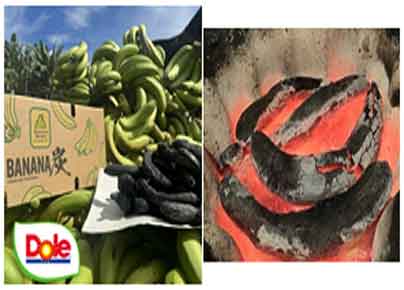Dole Japan transforms imperfect bananas into charcoal to combat food waste
2025-06-13

More than 60 companies in Japan are utilising imperfect bananas, which would otherwise be discarded, to combat food waste. Dole Japan Inc., the leader of this initiative, has introduced a new product called "banana charcoal."
This innovative charcoal has attracted attention not only for its unique visual appeal but also for its ease of use and versatility in various applications. Japan imports approximately 1 million metric tons of bananas annually. Dole Japan handles between 200,000 and 250,000 tons of bananas each year, but around 20,000 tons are discarded annually in the Philippines, a major banana producer—due to not meeting market standards. Factors for rejection include blemishes on peels, incorrect sizes, and irregular shapes.
Additionally, bananas typically grow in bunches of 15 to 20, yet Japanese supermarkets often sell them in smaller bunches of four to six. Consequently, leftover bananas that are still marketable may also be discarded. In response to this issue, Dole Japan launched the "Mottainai Banana" project in 2021. The Japanese term "mottainai" signifies regrettable wastefulness. Over 60 companies in the confectionery, bakery, and other sectors have joined the initiative, utilising imperfect bananas to produce products such as juice, ice cream, and sweets. In fiscal year 2024, about 2,000 tons of these bananas were reportedly converted into various items.
Newly commercialised in April, banana charcoal is inspired by the Philippines' traditional practice of carbonising imperfect bananas for use as fertiliser. While its burn time is relatively short—about 30 minutes—it is lighter and easier to ignite than typical charcoal, making it suitable for barbecues. Additionally, it is easy to break apart and dispose of after use, enhancing user convenience.
Despite its pitch-black colour, the charcoal retains the original shape of the banana, giving it a distinctive appearance. Hiroshi Aoki, president of Dole Japan, expressed, "We hope people use banana charcoal during family barbecues or school camps and that it encourages awareness about food waste."
Banana charcoal has been available in limited quantities on the flea market website Mercari Shops since April 1, priced at 3,300 yen (approximately $23) for a 2-kilogram box, including tax. Dole Japan is also exploring sales through home improvement centres and supermarket chains.
The company plans to develop new products using banana charcoal, including toilet deodorisers and T-shirts made with banana charcoal ink. Aoki mentioned, "You can ignite the charcoals using about one-third of the usual amount of fire starter."
In the food industry, Starbucks Coffee Japan offered limited-time items in 2024 featuring Mottainai Bananas, including a Banana Brulee Frappuccino, rice flour banana muffins, and rice flour banana Swiss rolls.
Furthermore, Dole Japan promotes the "Office de Dole" initiative, delivering Mottainai Bananas to companies to support employees' healthy habits while reducing food waste. Currently, around 60 businesses engage in regular purchases. For example, Itochu Techno-Solutions Corp. began distributing approximately 2,000 bananas monthly to its Tokyo headquarters staff starting May 13.









